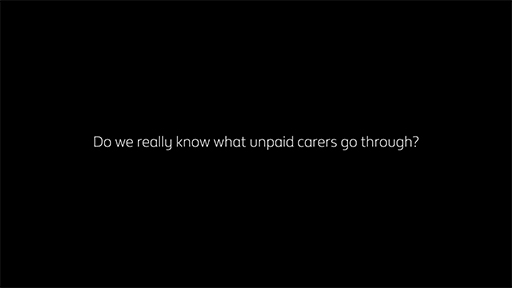5.1 Challenges of the caring role
In the introduction to this session, it was highlighted that often carers do not identify as being a carer. Video 4 illustrates this ‘hidden’ aspect of caring and also offers an important view of the caring role, in that often what is seen from the outside is not a reflection of what the carer is experiencing.

Transcript: Video 4 The hidden aspect of caring
[TEXT ON SCREEN: Do we really know what unpaid carers go through?]
[TEXT ON SCREEN: 72% of unpaid carers struggle with their mental health. But often those closest to them don’t realise. It’s time to talk about caring.]
Examining the challenges faced by carers in more detail, The Carers Week Research Report (Carers UK, 2020a) – reporting on survey findings from of over 4500 carers over the age of 18 – found that carers face the following difficulties:
- managing the stress and responsibility (71%)
- the negative impacts on their physical and mental health (70%)
- not being able to take time away from caring (66%)
- the impact it has on other personal relationships (e.g. with family, friends, partners etc.) (63%)
- the negative impact it has on their ability to do paid work (55%)
- the financial impact of the additional care costs (e.g. home adaptations) (53%)
- not having anyone to talk to about the challenges of caring (50%).
Whilst the majority of carers are adults, the Children’s Society (2021) reports that there are approximately 800,000 young carers and they may face different challenges due to their age. It is important to remember that each carer will face varying challenges and enjoy differing aspects of their caring role, so it is crucial that each is taken as an individual when considering their needs.
Activity 5
Reflect back to Jaiden’s case study (Activity 2) and watch Video 5. As you do so, consider the challenges faced by young carers. How are the challenges similar or different to those identified by the adult carers in the bulleted list above?
Discussion
You might have reflected that young carers experience similar challenges, and fulfilment, to adult carers, including not being able to take time away from the caring role and the impact on relationships, such as friends. One difference between young and adult carers might be the impact on their ability to do paid work, although one of the young carers talked about the impact on her school work, which is perhaps a direct comparison of role conflict.
You have examined some of the challenges faced by carers but what are the impact of these on their mental health? In the final section of Session 1 you will explore the implications of these challenges on mental health and hear from one of the UK’s leading researchers on caring, Professor Mary Larkin.
